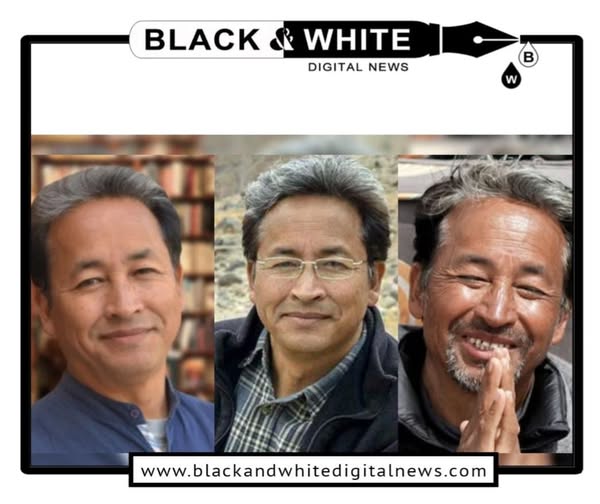Is This the Death of Democracy? The Detention of Sonam Wangchuk and the Shrinking Space for Dissent.
||Black & White Digital News||
||Tejveer Singh September 27,2025||
When Sonam Wangchuk an engineer, educator, environmentalist, and long‐standing advocate for Ladakh’s constitutional rights is detained under the National Security Act (NSA) following protests in Leh, many observers saw more than just a law‐and‐order action. They saw a harbinger of democratic decay. What happens when the state responds to a protest rooted in constitutional promises, ecological urgency, and nonviolent dissent by invoking the harshest powers it has? The answer is chilling: when peaceful critique becomes criminalised, democracy withers.
1. The Context: Ladakh’s Demands and Protest
The unrest in Ladakh is not spontaneous or isolated. For years, the people of this Himalayan region have pressed for three core demands: statehood, inclusion under the Sixth Schedule (granting special constitutional safeguards), and local governance autonomy to protect land, identity, and ecology.
Wangchuk had responded by staging a hunger strike from September 10 onward, demanding that the government deliver results rather than engage in indefinite consultations.
When protests turned violent in Leh (September 24), four people died, many were injured, police vehicles and offices were torched, and the administration imposed curfews and suspended mobile internet services.
The government blamed Wangchuk, accusing him of making “provocative statements” that incited the youth and led to violence.
But Wangchuk’s supporters and civil society voices insist that he had repeatedly urged restraint, and that attributing the violence to him amounts to scapegoating.
Soon after, the Home Ministry cancelled the FCRA (Foreign Contributions Regulation Act) licence of his NGO, SECMOL, alleging legal violations, further intensifying the crackdown.
In effect, the government appears to have deployed a cocktail of tools like arrest, curfew, internet blackout, penal laws, regulatory suspension to silence or contain a discontented movement.
2. Why This Moment Matters: Democracy Under Strain
That detention of someone like Wangchuk is being defended by many as a state’s right to maintain order is precisely why this moment demands scrutiny. Several trends are immediately alarming:
a) Criminalising dissent under national security rhetoric
The invocation of the NSA against a protest leader whose demands are constitutional not seditious sets a dangerous precedent. National security laws are supposed to counter genuine threats, not protest. When they are used against voices demanding accountability, they become tools of authoritarian control.
b) Silencing nonviolent activism
Wangchuk’s public persona, and his appeal, rests on nonviolence, education, and ecological consciousness. The Indian Express editorial rightly notes that detaining someone who has “asked protesters … to abjure violence” risks transforming unarmed dissent into an existential crisis.
Historically, movements in India have gained moral heft when their leaders maintain high ground. Detaining such leadership is rarely a sign of strength, it is often a symptom of fear.
c) Erosion of procedural fairness
Reports suggest that Wangchuk’s wife claims their home was ransacked, and that he was “taken like a criminal, without trial, without reason.” Such accounts raise serious questions about due process and the rule of law, especially when the political stakes are high.
d) Chilling effect on civil society
The cancellation of SECMOL’s FCRA licence is not just punitive; it’s symbolic. It sends a message to NGOs, social movements, academics, and activists that to question power may invite severe retaliation.
When such regulatory pressure is combined with arrests, internet blackouts, and blunt state power, the adversarial space in democracy shrinks dangerously.
e) Democratic legitimacy vs. coercion
If democracy is more than elections, if it demands that citizens can question, protest, and mobilize peacefully then the logic of detaining principled dissent undermines its foundations. The fire that consumes one dissenting voice today may later consume many.
3. Responding to Criticisms: The “Violence Instigator” Line
It is essential to engage with the counterclaims, not dismiss them. The government alleges that Wangchuk’s rhetoric provoked the protests, citing statements referencing Gen Z uprisings or an “Arab Spring style” movement.
But a few counterpoints stand:
Causation is far from proven, To claim that rhetorical statements caused a mob requires concrete evidence. The leap from speech to violence is often unjustified and speculative.
Protest dynamics are complex — Movements rarely stay within the control of their leaders once they gain momentum. Youth, local groups, and spontaneous actors often take initiative beyond leadership script.
Detention does not guarantee quelling unrest, Wangchuk himself called the action a “scapegoat tactic,” warning it may backfire.
Speakers vs. actors Denouncing violence is different from causing it; a legitimate protest leader cannot be held liable for every act by a rogue element.
4. The Stakes: Why This Is Beyond Ladakh
Though the immediate conflict is in Ladakh, its implications ripple across India’s democratic fabric:
Minority and regional voices under pressure: If Ladakh’s pleas for constitutional safeguards can be suppressed, no regional or marginalized demand is safe.
Precedent for future dissent: The logic used here detain first, justify later may be reused against other movements. Democracy cannot survive in constant legal shadow.
Citizenship and rights: When civil liberties are sacrificed for security claims, the citizen becomes suspect, not sovereign. That inversion is deeply dangerous.
Death by A Thousand Cuts?
Does the detention of Sonam Wangchuk mean democracy is dead? Perhaps not yet. But the act accelerates its erosion. Democracy dies not only in rampant authoritarian coups, but in a thousand small suppressions, in deterrence, in fear, in the normalization of silence.
Sonam Wangchuk’s detention is not just about one man or even one region. It is about whether citizens anywhere in India can still challenge power, peacefully and publicly, without fear of being criminalised. If a voice such as his can be muffled under the guise of national security, what protection remains for the ordinary citizen who dares speak?
The test now is whether the state will respond with dialogue, accountability, and procedural fairness or deepen the repression and normalize the notion that democracy exists only when power is unchallenged.
The world will watch. India’s conscience should speak.



